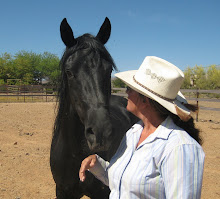It's an old saw and is in my book, but I also understand that the depth of the concept is frequently not understood. Will your horse do as you ask forward, backward, left, right, up, down or stand still WHEN you ask?
If we even ask this question of ourselves, we get to the do as you ask and then aren't very precise about the answer. But, the second part of the concept is WHEN you ask.
If a horse does what you ask because he was going to do it anyway, or it's convenient for him, or it's not a big deal, no difficulty or stretch, that isn't what we're going for here. Will your horse do it when he doesn't want to?
This takes time setting up situations where you can test horse's responses and test your own skills, observations and knowledge. While you don't need to have the exact experience that you may encounter down the road, it certainly helps if you take every opportunity that arises and make up others.
Taking every opportunity encompasses a lot more from the person in awareness and a lot less of making opportunities. This is because all the little things that horse does that person does not correct/teach are where the opportunities are. A step here, a shift in weight there, put this foot here, no, not that foot and don't shove me with your nose when you're irritated. You can pin your ears and swish your tail, but not for very long. Only as long as I see that you're trying to figure it out. Do you have to? How can you get out of this? You don't understand. Yes, horse those are perfectly fine questions for you to have and contemplate. I'll wait. Well, ready to give it another shot? Well yes, we are working on this. No, not that foot. No, not there. That wasn't it. Nope, not that. I'll wait. But, I'm going to keep asking and only helping you with a small clue every so often if I think you really don't UNDERSTAND. I'm not going to help you much if you're just being difficult because you think you can out persist me.
ALL this can happen just walking over to where you were going to tack up. If you tack up without fixing these slights, they will carry over to the ride where you might have a bit more trouble with them once you're mounted. Even if you don't have trouble that day, when the chips are down or the vet is there or some other crisis arises, right when you really hope that your horse is going to do as you ask WHEN you ask, horse is going to say, "well, I rarely do as you ask, why would I do it when I REALLY don't want to"? And horse's response is right. Why would he? It, of course, is a matter of trust and respect along with time spent earning both that contributes to cooperation and accomplishment.
People just want to get on. Sadly, getting on isn't as much fun as it could be if horse did what person wanted. This doesn't make horse bad or wrong. Not at all. Just a horse. Person doesn't take the time to be precise and horse is aware of every lapse of precision because he gets points for it.
